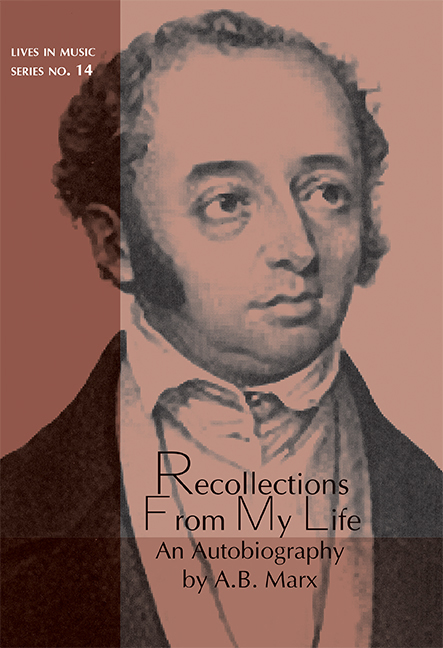Book contents
- Frontmatter
- Contents
- Introduction
- Select Bibliography
- Contents of Volume One
- 1 My Father's House
- 2 Musical Beginnings
- 3 War
- 4 Starting with Composition and Theory
- 5 The Theater in Weimar
- 6 War, again
- 7 The University
- 8 Early incentives for the practice of law
- 9 Legal practitioners
- 10 From Halle to Naumburg
- 11 To Berlin
- 12 Berlin
- 13 Fata Morgana
- 14 Personal relationships
- 15 The Berlin Opera at its height
- 16 Spontini
- Contents of Volume Two
- Afterword in place of foreword
- Translator's Note on Indexing
4 - Starting with Composition and Theory
from Contents of Volume One
- Frontmatter
- Contents
- Introduction
- Select Bibliography
- Contents of Volume One
- 1 My Father's House
- 2 Musical Beginnings
- 3 War
- 4 Starting with Composition and Theory
- 5 The Theater in Weimar
- 6 War, again
- 7 The University
- 8 Early incentives for the practice of law
- 9 Legal practitioners
- 10 From Halle to Naumburg
- 11 To Berlin
- 12 Berlin
- 13 Fata Morgana
- 14 Personal relationships
- 15 The Berlin Opera at its height
- 16 Spontini
- Contents of Volume Two
- Afterword in place of foreword
- Translator's Note on Indexing
Summary
I had improvised since I had possessed a keyboard; at least, I cannot remember a time in which that did not take place. How? Only God, who knows everything, knows! The time of the war, and certainly the years 1806 or 1807 were decisive in giving the first impulse to written composition.
My father, probably with no other goal than for play, had given me a little book with lined pages. I can see it before me in my mind's eye, with its blue and red marbled cover, and each page of the rough yellow paper covered with two systems.
Probably nothing was more amusing to me than the little post horn of the French voltigeur [combat soldier], which sounded so high and perky, when the handsome and brightly be-braided and be-laced troops more danced than marched by. I improvised myself such a voltigeur-march, and wrote it down with feverishly trembling hands in my notebook.
My friends, whom I allowed to hear it, seemed pleased; I, however, as is obvious, was satisfied. Why these reminiscences? I did not think about it at all, and I still can't believe it - it sounded much too “tudesque” [Germanic]. Why did I choose F-sharp major? Well, who can know everything? Now it is there in notes! But the longer I looked at it, the more my young heart became uneasy. Something was missing, but I did not know what; my page of music did not look like the rest. Finally, it became clear to me! It was missing the barlines! That could be remedied — the quill flew tirelessly from top to bottom, in one measure there were 4 or 5 eighth-notes, in another 1 quarter-note, according to the wanderings of the quill; for, I poor child, had never learned, what bar lines really meant; probably the loud counting of my teacher, and my inborn feeling, had reasonably straightened out the meter.
Many things followed for me as a student in the next few years. I only recall, from a somewhat later time, a more daring undertaking: my setting of Schiller's Semele. Of course, it only went as far as the first monologue. That this poem was not really suitable for musical treatment was something that I could not know at the time; here, as in all my musical undertakings, I followed a shadowy impulse, my pleasure in the subject.
- Type
- Chapter
- Information
- Recollections From My LifeAn Autobiography by A. B. Marx, pp. 19 - 27Publisher: Boydell & BrewerPrint publication year: 2017



